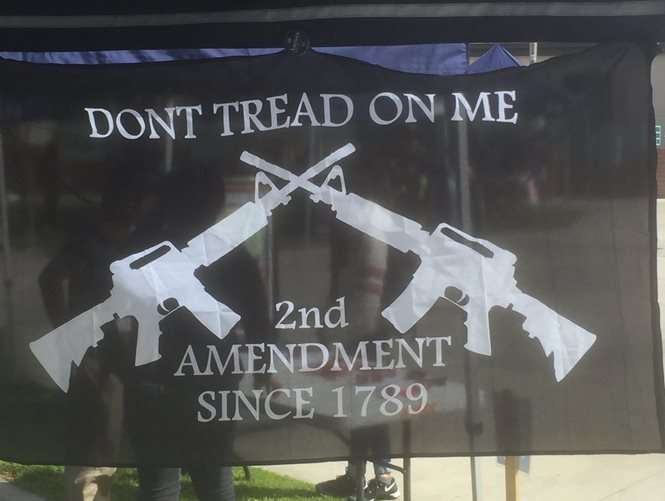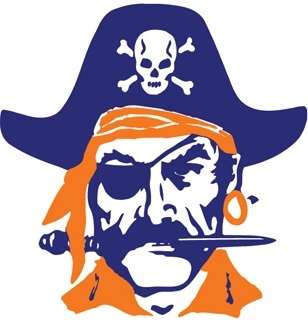The Volokh Conspiracy
Mostly law professors | Sometimes contrarian | Often libertarian | Always independent
Community College Bans Pro-Second-Amendment Banner with Picture of Rifles
A clear violation of the First Amendment -- and not even justified under the College's own stated reasons.


Townhall (Beth Baumann) reports that the Orange Coast College chapter of the Young Americans for Freedom was barred from displaying this banner at a campus student recruitment fair. The careful reader will doubtless say, "Ah, it must be because the college is deeply committed to historical precision, and officials insist that the Amendment has only existed as an Amendment, rather than just as a proposed Amendment, since 1791 rather than 1789." Well, no: According to the Townhall report, the College objected to the banner's depicting the sillouettes of two rifles—which, college officials said, were forbidden by a college policy that bars not just firearms but any "facsimile of a firearm."
But such a decision violates the First Amendment. Once a university opens up a space where students may display banners, it then may not restrict such displays unless the restriction is viewpoint-neutral and reasonable. It's hard to see a viewpoint-neutral rationale for banning even sillhouette displays of guns, which no-one would confuse for real guns.
But even if the rationale is viewpoint-neutral, it's not reasonable: To be reasonable, a restriction on speech within a government-created forum must be "consistent with the [government's] legitimate interest in 'preserv[ing] the property … for the use to which it is lawfully dedicated.'" Nothing about the display of rifle sillhouettes interferes with the government's legitimate interest in preserving campus property for its normal uses, except insofar as such a display conveys a pro-gun viewpoint to which some people object.
Indeed, Burnham v. Ianni (8th Cir. 1997) (en banc), rejected an attempt to exclude pictures of guns from a government-created forum (there, a display of professors' research interests), because such an exclusion was both unreasonable and viewpoint-based. The Eighth Circuit en banc majority reasoned,
The display case was designated for precisely the type of activity for which the Kohns and Professors Burnham and Marchese were using it. It was intended to inform students, faculty and community members of events in and interests of the history department. The University was not obligated to create the display case, nor did it have to open the case for use by history department faculty and students. However, once it chose to open the case, it was prevented from unreasonably distinguishing among the types of speech it would allow within the forum. Since the purpose of the case was the dissemination of information about the history department, the suppression of exactly that type of information was simply not reasonable.
The same reasoning would apply here: The recruitment fair was designated for precisely the type of activity for which YAF was using it. It was intended to inform students of events put on by and interests of student groups. The University was not obligated to create the fair, nor did it have to open it for student groups. However, once it chose to open the fair, it was prevented from unreasonably distinguishing among the types of speech it would allow within the forum. Since the purpose of the fair was the dissemination of information about student groups, the suppression of exactly that type of information was simply not reasonable.
But beyond this, it doesn't even make sense to read the college policy as banning the banner. The policy, titled "WEAPONS PROHIBITED ON DISTRICT PROPERTY," says,
Firearms, knives, explosives or other dangerous objects, including, but not limited to any facsimile of a firearm, knife, or explosive, are prohibited on District property, at the colleges, or any college satellite location.
A sillhouette of a rifle isn't a "facsimile of a firearm" as that term is normally used, in legal contexts or others. A facsimile would be something that, in the words of one state statute (from Wisconsin), "means any replica, toy, starter pistol or other object that bears a reasonable resemblance to or that reasonably can be perceived to be an actual firearm."
Facsimiles are potentially dangerous (whether or not you think they should be banned) because they might be mistaken for real guns, and thus be perceived as threats, whether deliberately (for instance, if someone uses a facsimile gun to rob someone) or accidentally (for instance, if police officers think a facsimile gun that someone is playing with is a real gun). An image on a banner lacks those qualities; it can't "reasonably … be perceived to be an actual firearm," and it doesn't bear a resemblance to a gun in the sense of looking like a gun (rather than like a picture of a gun). And that's especially clear because the policy bans "dangerous objects, including … any facsimile of a firearm"; that is most recently read as barring facsimiles that are actually dangerous (i.e., ones that can be mistaken for a gun) rather than pictures that are not at all dangerous.
So I think the policy itself doesn't violate the First Amendment, precisely because it is properly read as not extending to pictures such as this. But if the policy is read as covering such pictures on banners, then it does violate the First Amendment. And in any event, the college's actions violate the First Amendment.
Townhall reports that "Orange Coast College did not immediately respond to Townhall's request for comment"; I likewise reached out to the College media relations after-hours phone number and e-mail address this (Saturday) morning, and haven't yet heard back from them. If I do hear back, I will of course update the post accordingly. [UPDATE: I heard back from an OCC representative, and it appears that the facts as reported in Townhall are accurate; I've therefore revised the post to remove some uses of "reportedly" and similar qualifiers.]
For cases that uphold even K-12 students' right to display images of firearms (there, on T-shirts), see Schoenecker v. Koopman (E.D. Wis. 2018) and Newsom ex rel. Newsom v. Albemarle County School Board (4th Cir. 2003).
UPDATE: I just noticed that the Orange Coast College sports teams are the Pirates, and their logo includes what, under the College's theory, is a prohibited "facsimile of a … knife."

Arrr.


Show Comments (115)